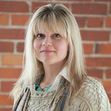J.P. Choquette's Blog, page 6
April 9, 2018
Reading Habits for #booknerds & #Bookworms
 All right fellow booknerds and bookworms: I have a pressing question for you today: what are your special reading habits?
All right fellow booknerds and bookworms: I have a pressing question for you today: what are your special reading habits? The topic of this post is similar to one I wrote about recently on the blog, " Do You Have a Reading Ritual ?" It's also in the same vein as this post, " Do Your Suspense Tastes Change with the Seasons ?"
I was inspired to write this post after reading a great one called, " My Reading Habits ," over at I Wish I Lived in a Library. Katherine offered some great behind-the-scenes info about her own reading habits. I thought it would be fun to do something similar here.
In no specific order, here are five questions about my own reading habits. Please chime in and share your answers in the comments!
Q1: What time of day is set aside for reading?
A: I have a fifteen-minute block of time after lunch when I most enjoy reading. I have been doing it for years and it is very relaxing. I sip my (decaf) coffee and let go of the morning busyness and just unwind...ahhhh. Lovely!
Q2: Where do you most enjoy reading?
A: I usually read curled up in a corner of the couch. I also like to read in bed before sleeping if I'm not too tired.
Q3: Sticky note, scrap of paper or proper bookmark?
A: Sadly, you'll find the most ugly things marking my place. I have been gifted with pretty, REAL bookmarks over my life, but somehow my books end up with scraps of junk mail, crumpled post-it notes or (ahem) as is the case right now, a piece of a tissue. But at least it's a CLEAN tissue.
Q4: How do you choose your next book to read?
A: This is tricky! I will sometimes pick up a book if it's recommended to me by a friend. I'm also part of a mystery/suspense online readers' group and sometimes I get ideas from there. I also love browsing used book shops and used book sales and admit that I will frequently pick up a book due to its cover.
I went through a minimalism phase where I donated about 75 percent of my books (!). Now I'm back to collecting them, but with care. I still don't like clutter and figure I can get most at the library when I'm ready to read them.
Q5: If you start reading a book and don't like it, do you plow through anyway or give up on it?
A: Give up! This didn't used to be the case though. When I was younger (teens) I would keep going no matter what. But then college came and then work, family and other things that take up my time. Now my reading time is so limited/precious that I will only read things that I really enjoy.
Now it's your turn, readers. Please answer these questions in the comments below. I can't wait to find out more about your reading habits and preferences. :)
Published on April 09, 2018 08:26
April 4, 2018
How Ecotherapy can improve your mental health
Really excited today to share a guest post over at C.W. Hawes' cool site. C.W., you might remember from his visit here and post about
families reading together
, is the author of a variety of genres of books.
Stop by to read How Ecotherapy Can Improve Your Mental Health when you have a minute.
Stop by to read How Ecotherapy Can Improve Your Mental Health when you have a minute.
Published on April 04, 2018 08:44
April 2, 2018
3 Women Suspense Authors Who changed the literary world
I'm a bit late for Women's History Month, but have been thinking about sharing some of my favorite women suspense authors with you here on the blog for some time. Today, we're going to go back in history and learn more about three authors who changed the literary world. They are: Mary Roberts Rinehart, Agatha Christie and Patricia Clapp. Like any good journalist, I'm going to cover the Five Ws: Who, What Where, When and Why...the last "w" being why you might want to pick up one of their books. 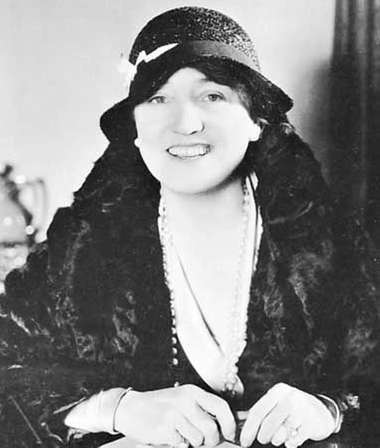 image credit: Britannica.com Who: Mary Roberts Rhinehart had an interesting start in the literary world: she became a writer because of financial need. This in itself might not be so surprising, except that she was married to a doctor. Apparently, the couple was in financial distress and Mary Roberts Rhinehart began to write and sell her fictional articles in magazines.
image credit: Britannica.com Who: Mary Roberts Rhinehart had an interesting start in the literary world: she became a writer because of financial need. This in itself might not be so surprising, except that she was married to a doctor. Apparently, the couple was in financial distress and Mary Roberts Rhinehart began to write and sell her fictional articles in magazines.
What: The author of 60 mystery books, nine plays, and many short stories published in magazines like the Saturday Evening Post.
Where: Mary Roberts Rhinehart was originally from Pittsburgh, PA, but later lived among homes located in Bar Harbor, ME, and Park Avenue in NYC.
When: She was first published in 1908 and continued to write prolifically until her death in 1858.
Why: Mary Roberts Rhinehart wrote books that evoked suspense and oozed atmosphere all without going into the gory details of a story. Her book, The Yellow Room, was a fascinating read and would be a great introduction to her work.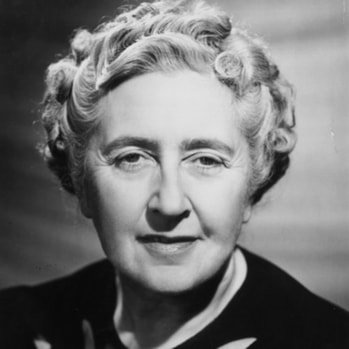 image credit: Biography.com Oh, Mrs. Christie: what can I say that hasn't been said a million times before? Let's cover the five W's and see if we learn anything new, shall we?
image credit: Biography.com Oh, Mrs. Christie: what can I say that hasn't been said a million times before? Let's cover the five W's and see if we learn anything new, shall we?
Who: Born Agatha Mary Clarissa Miller, Christie published her first novel, The Mysterious Affair at Styles, in 1920.
What: A prolific writer, Agatha Christie penned more than 70 mystery novels during her lifetime. She also wrote romance novels under a pen name (Mary Westmacott), many short stories and plays, too. Several of her books have gone on to become movies, and of course, her most famous characters, Hercules Poirot and Miss Marple had their own TV series.
Where: Christie was born in in Torquay, Devon, (England) and later lived in her beautiful "dream home," Greenway. ( You can tour Greenway if you'd like!)
When: Agatha Christie was born in 1890 and was named dame in 1971. She passed away in 1976.
Why: So many reasons to enjoy Agatha Christie's books: one of my top ones? Because I have yet to figure out "who did it," and the motive both, a sure sign of a great mystery writer.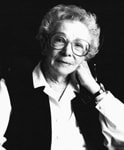 image credit: Goodreads (sorry it's so small!) Who: Patrica Clapp was something of a mystery herself. She was born in 1912 and her first work was the novel, Constance: A Story of Early Plymouth.
image credit: Goodreads (sorry it's so small!) Who: Patrica Clapp was something of a mystery herself. She was born in 1912 and her first work was the novel, Constance: A Story of Early Plymouth.
What: Unlike the other two authors above, Ms. Clapp was not a prolific writer. She is credited with 10 published works, most of these children's books. I was introduced to her by a wonderful friend with similar reading tastes. Ms. Clapp's book, Jane-Emily, was probably my favorite read of 2017. According to her biography via Harper Collins, the author actually identified as more of a "theater person," than a writer, and worked in community theater for 40 years.
Where: Patricia Clapp was born in Boston, MA, and lived in Upper Montclair, New Jersey.
When: The author was born in 1912 and passed away in 2003.
Why: Jane-Emily is a Gothic-suspense that will draw you in from the very first page. I believe in today's classification system, it would be considered Juvenile Fiction, but I enjoyed it greatly. It's spooky and haunting with beautiful prose and, oddly, a bit of humor that somehow works perfectly.
Who did I miss? This is just a short overview of three of my favorite vintage female suspense authors, but who would you add to the list? Share you thoughts in the comments.
 image credit: Britannica.com Who: Mary Roberts Rhinehart had an interesting start in the literary world: she became a writer because of financial need. This in itself might not be so surprising, except that she was married to a doctor. Apparently, the couple was in financial distress and Mary Roberts Rhinehart began to write and sell her fictional articles in magazines.
image credit: Britannica.com Who: Mary Roberts Rhinehart had an interesting start in the literary world: she became a writer because of financial need. This in itself might not be so surprising, except that she was married to a doctor. Apparently, the couple was in financial distress and Mary Roberts Rhinehart began to write and sell her fictional articles in magazines. What: The author of 60 mystery books, nine plays, and many short stories published in magazines like the Saturday Evening Post.
Where: Mary Roberts Rhinehart was originally from Pittsburgh, PA, but later lived among homes located in Bar Harbor, ME, and Park Avenue in NYC.
When: She was first published in 1908 and continued to write prolifically until her death in 1858.
Why: Mary Roberts Rhinehart wrote books that evoked suspense and oozed atmosphere all without going into the gory details of a story. Her book, The Yellow Room, was a fascinating read and would be a great introduction to her work.
 image credit: Biography.com Oh, Mrs. Christie: what can I say that hasn't been said a million times before? Let's cover the five W's and see if we learn anything new, shall we?
image credit: Biography.com Oh, Mrs. Christie: what can I say that hasn't been said a million times before? Let's cover the five W's and see if we learn anything new, shall we? Who: Born Agatha Mary Clarissa Miller, Christie published her first novel, The Mysterious Affair at Styles, in 1920.
What: A prolific writer, Agatha Christie penned more than 70 mystery novels during her lifetime. She also wrote romance novels under a pen name (Mary Westmacott), many short stories and plays, too. Several of her books have gone on to become movies, and of course, her most famous characters, Hercules Poirot and Miss Marple had their own TV series.
Where: Christie was born in in Torquay, Devon, (England) and later lived in her beautiful "dream home," Greenway. ( You can tour Greenway if you'd like!)
When: Agatha Christie was born in 1890 and was named dame in 1971. She passed away in 1976.
Why: So many reasons to enjoy Agatha Christie's books: one of my top ones? Because I have yet to figure out "who did it," and the motive both, a sure sign of a great mystery writer.
 image credit: Goodreads (sorry it's so small!) Who: Patrica Clapp was something of a mystery herself. She was born in 1912 and her first work was the novel, Constance: A Story of Early Plymouth.
image credit: Goodreads (sorry it's so small!) Who: Patrica Clapp was something of a mystery herself. She was born in 1912 and her first work was the novel, Constance: A Story of Early Plymouth.What: Unlike the other two authors above, Ms. Clapp was not a prolific writer. She is credited with 10 published works, most of these children's books. I was introduced to her by a wonderful friend with similar reading tastes. Ms. Clapp's book, Jane-Emily, was probably my favorite read of 2017. According to her biography via Harper Collins, the author actually identified as more of a "theater person," than a writer, and worked in community theater for 40 years.
Where: Patricia Clapp was born in Boston, MA, and lived in Upper Montclair, New Jersey.
When: The author was born in 1912 and passed away in 2003.
Why: Jane-Emily is a Gothic-suspense that will draw you in from the very first page. I believe in today's classification system, it would be considered Juvenile Fiction, but I enjoyed it greatly. It's spooky and haunting with beautiful prose and, oddly, a bit of humor that somehow works perfectly.
Who did I miss? This is just a short overview of three of my favorite vintage female suspense authors, but who would you add to the list? Share you thoughts in the comments.
Published on April 02, 2018 07:50
March 28, 2018
The magic of audio fiction
 image credit When you were a kid, did you like being read to? I LOVED it. Not only did my older sister, Aimee, read to me all the time but sometimes my father read to all of us. Those are some really great memories. (If you'd like to start a read-aloud tradition in your family, C.W. Hawes has some great ideas to help.)
image credit When you were a kid, did you like being read to? I LOVED it. Not only did my older sister, Aimee, read to me all the time but sometimes my father read to all of us. Those are some really great memories. (If you'd like to start a read-aloud tradition in your family, C.W. Hawes has some great ideas to help.) Happily, being read to doesn't have to stop just because you're a grownup. Audio books are in fact the fastest growing segment of the digital publishing industry right now. And Americans are listening in droves. According to the Audiobook Publishers Association, 26 percent of the U.S. population has listened to an audiobook in the last 12 months. (Read the blog post where I pulled this information from.)
You can often borrow audio books on CD from your local library. If you're not a fan though, (too cumbersome, perhaps?) there are other options. You could choose a Playaway --a pre-loaded, small listening device which you can use with earbuds or plug in to your car's auxiliary jack. Or get a subscription to Audible, Amazon's popular audiobook service. There is also another option and this one is completely free: radio dramas.
When I was working full-time at a mind-numbing job, I used to listen to radio dramas like " Suspense ," which are really well done. Picture creaking doors, the sound of bat wings flapping, the drip, drip, drip of a leaky roof when a young couple takes refuge in an abandoned house after their car breaks down...great stuff!
This blogger put together a list of Top 10 Best Fiction Podcasts which you might find helpful. I'm sure there are also a lot of fiction podcasts if you search on iTunes, too.
How do you like to listen to books? Please let me know in the comments section.
Published on March 28, 2018 08:16
March 26, 2018
Why I'm a Christian who Doesn't write christian
 "The world doesn't need more Christian literature. The world needs more Christians writing good literature." ~C.S. Lewis For years I struggled with my decision to write "general" fiction rather than Christian fiction. After all, as a believer doesn't the fact that I eschew writing faith-based fiction mean that I'm not using my talents for good? Doesn't it indicate that I'm ashamed of my faith or trying to hide my religious leanings?
"The world doesn't need more Christian literature. The world needs more Christians writing good literature." ~C.S. Lewis For years I struggled with my decision to write "general" fiction rather than Christian fiction. After all, as a believer doesn't the fact that I eschew writing faith-based fiction mean that I'm not using my talents for good? Doesn't it indicate that I'm ashamed of my faith or trying to hide my religious leanings? Actually, no.
A writing friend once told me that I can't not write from my Christian perspective. Everything that I see/experience/write is filtered through that. She also pointed out (when I worried that my books were too violent, gritty, messy) that there is nothing in my books that didn't happen in the Bible. Human nature is human nature, no matter the timeline.
Here's the simple truth as I see it today: I was called to be a writer as my career. And I was called to be light in a dark world because of my faith. If I chose to write Christian fiction for other believers my light would be doing what exactly? Making their light brighter? But if someone who isn't a Christian reads one of my books and sees hope, that's fantastic. If they read it and toss it aside with a "Meh, that was pretty entertaining," and don't get anything else out of it, then that's fine too.
The quote above by C.S. Lewis is one that is hanging over my desk right now. Because what the world needs IS more Christians writing what they are passionate about and what they're meant to write. Not what they think they "should" write or what their pastor or parent or friend encourages them to write.
The deeper exploration into human nature and spiritual issues is something that fascinates me. And I think from reading many of my books reviews , others feel the same way.
The fact is that we're all flawed. We're all broken in some way. And finding people who look and talk and act like us on the page (bad habits, stupid choices and all) means that an author is doing his or her job correctly. Even if it's ugly. Even if it's uncomfortable at times. The important part is remembering that no matter how dark the situation, hope shines through.
Published on March 26, 2018 11:42
March 20, 2018
My weird outlining process & Creepy Dolls
 You know how you might envy someone who keeps an immaculate house, drives a big, shiny SUV, or has perfectly-behaved children? Well, I envy authors who outline.
You know how you might envy someone who keeps an immaculate house, drives a big, shiny SUV, or has perfectly-behaved children? Well, I envy authors who outline. Outlining? Not for me. No, I'm a fly-by-the-seat-of-my-pants type, a rebel. A true jump-in-with-both-feet type of girl. Which is fine and great in its way. Writing fiction is pretty much the only time that I "break the rules," and do things in an un-planned for fashion. It's fun to throw caution to the wind and write freely without thought of what might show up next on the page...until you're not sure what should show up next on the page. Or until the dreaded editing process begins.
Have I mentioned previously that I don't like the editing process much? It's true. Give me the freedom of the empty page and the energy that comes pouring out while I'm working on that messy and imperfect first draft. But then the editing starts and GAH! I want to run from my desk and hide, preferably with a tub of dairy-free ice cream in a room streaming Netflix.
I've just discovered a new way of outlining through, that doesn't hurt quite so much. I still do this after the first draft is written (I know, I'm weird but you've gotta go with what works) and use index cards to track the major points in the novel. Other writers are all high-tech with Scrivener, but I'm more of a Luddite. And that's OK.
I'm really enjoying this new system. Above, you'll see many of the cards spread out for "Pretty Poison," my seventh book (coming 2019). The blank cards at the end of the rows gave away the plot, so I had to flip them over.
Currently, I'm working from another set of index cards. These are helping me to better flesh out the main points in my sixth book, the Creepy Doll Book (*not it's real title). In honor of this book which will be coming out later this year, I thought it would be fun to go on a little Creepy Doll Field Trip. Here are some frightening dolls that I found while browsing the internet. Vote for your favorite in the comments!
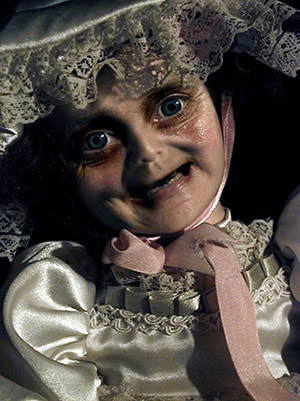 image credit
image credit 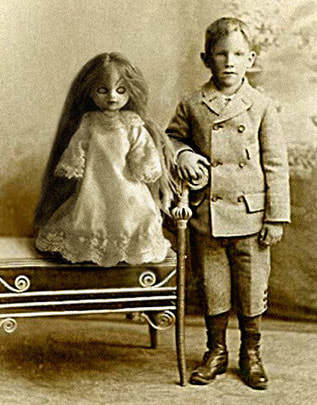 image credit
image credit 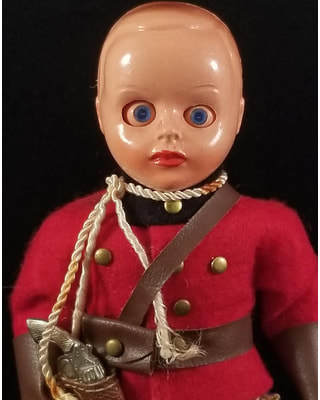 image credit
image credit  image credit
image credit  image credit
image credit
Published on March 20, 2018 07:49
March 7, 2018
Half-Price Sale
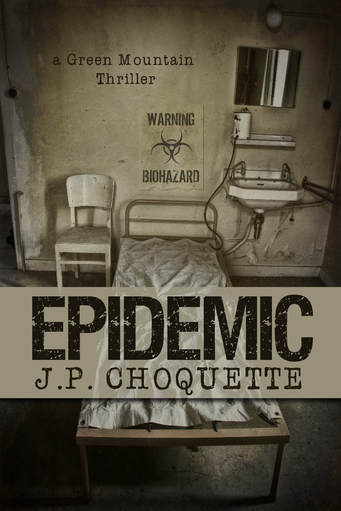 Have I told you lately that I appreciate you? Well, I do. In fact, I'm brainstorming ways in which I can show you more frequently that I'm grateful for your interest in and support of my work.
Have I told you lately that I appreciate you? Well, I do. In fact, I'm brainstorming ways in which I can show you more frequently that I'm grateful for your interest in and support of my work. Right now, for instance, there is a special sale going on for readers of this blog. Enjoy Epidemic, for half the regular price. Here's what a few reviewers had to say about this twisty-turning, fast-paced suspense novel:
"Tightly written, well paced..." "The theme which is thought provoking and grippingly real gives one food for thought and highlights the competitive greed of some pharmaceutical companies." "Definitely a great read even if you don't live in Vermont!"
You can snag a digital copy of Epidemic for only $2.49 . Just use this code (YP72S) at checkout.
Hope you enjoy!
Published on March 07, 2018 07:38
March 5, 2018
Guest Author Roundup
 {image credit} Over the past few years, I've had the pleasure of having some visiting authors provide a guest post. It's always fun to learn more about the writing practices of other writers, and to learn more about the topics that they're passionate about, as well as their books. Most recently, we met C. W. Hawes, in
this post about family reading time
and what some of its biggest benefits are. You can learn more about C.W. Hawes and his books at his website. Faith Mortimer stopped by to talk about the writing process she uses to pen her mystery/romance novels. Ms. Mortimer is based in the U.K. (one of my favorite places!). Learn more about her work by
visiting her website
. Then there was James Schanepp.
Mr. Schanepp writes Click Your Poison Books
, which are like a grown-ups version of the choose-your-own ending books we loved as kids. His writing process and books are fascinating and you can check them out
via his website.
Fan of Dame Agatha Christie's work? Then you'll want to go and read
this guest post by author Eric Keith.
Eric attributes his love for writing to literary greats like James Joyce and Henry James among others, and loves to surprise his readers.
Visit Mr. Keith's website
for more details on his work.
{image credit} Over the past few years, I've had the pleasure of having some visiting authors provide a guest post. It's always fun to learn more about the writing practices of other writers, and to learn more about the topics that they're passionate about, as well as their books. Most recently, we met C. W. Hawes, in
this post about family reading time
and what some of its biggest benefits are. You can learn more about C.W. Hawes and his books at his website. Faith Mortimer stopped by to talk about the writing process she uses to pen her mystery/romance novels. Ms. Mortimer is based in the U.K. (one of my favorite places!). Learn more about her work by
visiting her website
. Then there was James Schanepp.
Mr. Schanepp writes Click Your Poison Books
, which are like a grown-ups version of the choose-your-own ending books we loved as kids. His writing process and books are fascinating and you can check them out
via his website.
Fan of Dame Agatha Christie's work? Then you'll want to go and read
this guest post by author Eric Keith.
Eric attributes his love for writing to literary greats like James Joyce and Henry James among others, and loves to surprise his readers.
Visit Mr. Keith's website
for more details on his work. Hope you'll enjoy this author roundup. I'm always looking for ways to make the blog more fun. If there is an author you'd like to see interviewed, please share in the comments and I'll do my best to feature him/her here.
Published on March 05, 2018 05:53
March 1, 2018
VLog ~ February reading recommendations
Just realized I forgot to post my February reading recommendations in the actual month of February--doh! I'm trying some video this month (well, last month)--let me know what you think. Pay no attention to that terrified deer-in-headlights look--it is funny though, isn't it?
Published on March 01, 2018 08:36
February 27, 2018
Do you value creative Work?
 image credit If you're a creative, you likely feel guilty when you take time "away" from "real life" to practice your art. This is an epidemic in the creative field and one that I am becoming more and more frustrated by.
image credit If you're a creative, you likely feel guilty when you take time "away" from "real life" to practice your art. This is an epidemic in the creative field and one that I am becoming more and more frustrated by. Too few artists and writers and musicians have the luxury of doing their work on a full-time basis. When we talk about making our art as our career, it's often in awe-laced voices. Smile lines around the eyes deepen and a happy glow radiates from our faces. Phrased like, “Someday…" and “When I retire…" and “Wouldn’t it be wonderful …” are common phrases we too often mutter.
Why is the world set up in a way so that bankers and accountants and software engineers and business owners are lauded and given the head nod of approval, while those of us who create are told to “do it in your free time?” Where has the respect for art and creativity gone? Why do we as a culture no longer embrace the creative gifts the same way as we did in the Renaissance Period?
Maybe my view is skewed. I certainly didn't get enough sleep last night. Still, it irks me that creatives gifts are seen as “less than,” because our society views money-making endeavors as more important. But when did the dollar bill outshine the importance of creating? When did the banks become more important than the art galleries, and Wall Street more valued than creative expression?
When did we decide as a culture that working 40 or 50 or 60 hours a week in a cubicle or warehouse or office was more important than living a full life, one that includes creative expression and communication—not just as a “side hustle,” but as our life’s work?
This is one of the reasons that I recently joined Patreon. Unfamiliar with this community? It's a platform that allows art patrons to support artists and their creative endeavors. I've been thinking for joining for a long time, but that little voice in my head held me back.
"Who are you to think that people would want to support your writing?"
"Don't you think that people have more important things to spend money on?"
"Get over yourself. There is no way that you'll get anyone to take a chance on your work."
Of course, that sealed the deal. If I've learned one thing from that negative, critical voice over the years it's this: do exactly what it fears most.
So I created an account on Patreon. You can watch the video below for more information, or check out my page there right now.
I believe that creativity matters. I believe that people love books and stories. And I believe that my career as an author and writer will grow stronger with the support of a community.
Published on February 27, 2018 06:56

